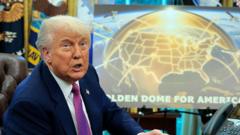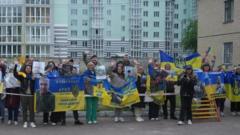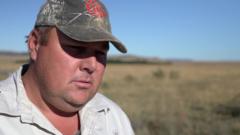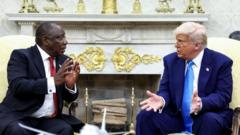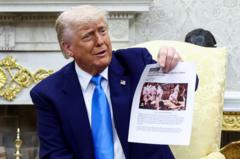Despite a turbulent meeting with Donald Trump that highlighted allegations of "white genocide" in South Africa, President Cyril Ramaphosa may leverage the diplomatic encounter to strengthen his standing domestically amid widespread political challenges.
Ramaphosa's Diplomatic Stance: Navigating Trump's Claims and South African Politics

Ramaphosa's Diplomatic Stance: Navigating Trump's Claims and South African Politics
South Africa's President Cyril Ramaphosa faces challenges at home and internationally after a contentious meeting with Donald Trump, whose claims of "white genocide" unsettled the political landscape.
In an unexpected diplomatic showdown this week, South Africa's President Cyril Ramaphosa faced a barrage of criticism from U.S. President Donald Trump, who reinforced his baseless assertions regarding a so-called "white genocide" in South Africa. The meeting, broadcast across various media platforms, was intended to foster a renewed partnership but instead turned into a politically charged confrontation, leaving Ramaphosa navigating a complex political landscape both at home and abroad.
Throughout the meeting, Ramaphosa was commended for his composed demeanor, showcasing his diplomatic experience, which many believe is crucial during this turbulent political climate. However, he also faced scrutiny for not countering Trump's inflammatory remarks more aggressively. This encounter comes at a time when the African National Congress (ANC), led by Ramaphosa, is grappling with internal factions and external pressures ahead of crucial elections in 2027.
The ANC's tenuous coalition government, formed after less-than-stellar electoral results, is under constant strain, with various parties clashing over key issues such as land reform and healthcare legislation. Ramaphosa's leadership is further complicated by South Africa's ongoing economic stagnation, rampant crime rates, and widespread corruption. Many political analysts view the recent electoral dynamics as a potential tipping point for the ANC, projecting significant shifts within the party and its approach.
Notably, Ramaphosa has emerged as a key figure in South Africa's historical narrative, credited with facilitating the end of apartheid and maintaining national unity amidst chaos. His previous successes lend him credibility, though some argue that he must accelerate his response to pressing national issues to maintain public support.
In the shadow of Trump's confrontation, the dynamics between Ramaphosa and opposition parties such as the Economic Freedom Fighters (EFF) have intensified. EFF leader Julius Malema, who found himself spotlighted during Trump's allegations, may pose a growing challenge to Ramaphosa's authority, despite doubts about Malema's ability to convert attention into electoral success.
Amidst the tumult, Ramaphosa's attempts at securing trade agreements with the U.S. remain pressing, as uncertainty looms over the renewal of the African Growth and Opportunity Act (AGOA), which is vital for South Africa's economic health. The meeting with Trump may, paradoxically, have reinvigorated perceptions of Ramaphosa's diplomatic skills, with some suggesting a rise in his approval ratings is on the horizon.
Political commentators emphasize that the optics of the meeting, featuring collaborative responses from Ramaphosa and other South African leaders, signal a united political front. This orchestrated display could bolster support for the ruling coalition and perhaps usher a renewed sense of stability in South African governance. As the dust settles from this dramatic episode, Ramaphosa faces the task of reconciling a fragmented political landscape while projecting strength in confrontations with global leaders.
Throughout the meeting, Ramaphosa was commended for his composed demeanor, showcasing his diplomatic experience, which many believe is crucial during this turbulent political climate. However, he also faced scrutiny for not countering Trump's inflammatory remarks more aggressively. This encounter comes at a time when the African National Congress (ANC), led by Ramaphosa, is grappling with internal factions and external pressures ahead of crucial elections in 2027.
The ANC's tenuous coalition government, formed after less-than-stellar electoral results, is under constant strain, with various parties clashing over key issues such as land reform and healthcare legislation. Ramaphosa's leadership is further complicated by South Africa's ongoing economic stagnation, rampant crime rates, and widespread corruption. Many political analysts view the recent electoral dynamics as a potential tipping point for the ANC, projecting significant shifts within the party and its approach.
Notably, Ramaphosa has emerged as a key figure in South Africa's historical narrative, credited with facilitating the end of apartheid and maintaining national unity amidst chaos. His previous successes lend him credibility, though some argue that he must accelerate his response to pressing national issues to maintain public support.
In the shadow of Trump's confrontation, the dynamics between Ramaphosa and opposition parties such as the Economic Freedom Fighters (EFF) have intensified. EFF leader Julius Malema, who found himself spotlighted during Trump's allegations, may pose a growing challenge to Ramaphosa's authority, despite doubts about Malema's ability to convert attention into electoral success.
Amidst the tumult, Ramaphosa's attempts at securing trade agreements with the U.S. remain pressing, as uncertainty looms over the renewal of the African Growth and Opportunity Act (AGOA), which is vital for South Africa's economic health. The meeting with Trump may, paradoxically, have reinvigorated perceptions of Ramaphosa's diplomatic skills, with some suggesting a rise in his approval ratings is on the horizon.
Political commentators emphasize that the optics of the meeting, featuring collaborative responses from Ramaphosa and other South African leaders, signal a united political front. This orchestrated display could bolster support for the ruling coalition and perhaps usher a renewed sense of stability in South African governance. As the dust settles from this dramatic episode, Ramaphosa faces the task of reconciling a fragmented political landscape while projecting strength in confrontations with global leaders.


